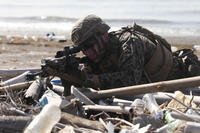It's as easy as a click of a mouse or a tap on a smartphone, and in a few seconds sensitive Army information might be shared that could get Soldiers killed.
With the ease of social media, in any part of the globe at any time, a Soldier, Army civilian, or family member can post pictures from a deployment or talk about an Army mission.
But these seemingly innocent posts could actually contain sensitive information that endangers Soldiers by revealing locations, security measures, mission operations, or troop movements, said the Army's social media experts.
Soldiers, Army civilians and family members need to be mindful of what they put online, with operations security at the forefront of their considerations, said Staff Sgt. Dale Sweetnam, with the Online and Social Media Division, Office of the Chief of Public Affairs.
He said this applies to whether the person is a Soldier or Army civilian communicating as an organization or as an individual on social media sites.
"Once it's out there, it's out there," he said. "You can delete it, but if the wrong person took a screen shot, that's actionable intelligence and you can't get that back."
Sweetnam compiled the Army's Social Media Handbook and conducts training for Soldiers about the dos and don'ts of posting on social media.
The dos include using social media to get out the message of your command, inform the public of Army activities or stay connected with loved ones. The don'ts, said Sweetnam, include revealing sensitive information about missions, units or Soldiers.
Besides considering operations security, Soldiers must maintain their professionalism at all times, even on their off time, said Sweetnam.
They are subject to the Uniform Code of Military Justice and could face corrective or disciplinary action if they violate the rules of conduct at any time, he said.
Those violations would include a Soldier releasing sensitive information, insulting his or her chain of command, posting discriminatory statements, or sharing or linking to inappropriate material.
STEPS TO PROTECT THE ARMY FAMILY
Sweetnam said the Army encourages Soldiers to share with their families the lessons of operations security and using social media.
"The spouse, when the Soldier is deployed, may post something about his or her return and that could be considered OPSEC," said Sweetnam. "It even goes an additional level to not only police yourself but to make sure your family knows what it can and cannot do."
The Army's social media experts tell Soldiers not to use location-based social networking services when deployed or in classified areas; for Soldiers and families not to post specific dates or locations of deployments; and recommend setting privacy settings to 'friends only' on personal accounts to prevent personal information from ending up in the wrong hands.
The Army warns users about the geotagging feature that is automatically turned on in some smartphones and digital cameras. Geotagging is the equivalent to adding a 10-digit grid coordinate to a photograph telling where it was taken, which could reveal sensitive information about a location -- information that terrorists could use to target Soldiers or Army installations.
Sweetnam said for the most part, Soldiers understand the importance of being vigilant at all times when using social media.
"The majority of the Soldiers who are in uniform now have grown up with social media. This is the way they communicate," he said. "They are more aware of the dos and don'ts and we don't necessarily have to constantly drive it into them, but occasionally we have to send out those reminders."
BE PROFESSIONAL AT ALL TIMES, SAYS ARMY
A post by a Soldier or Army civilian could be potentially taken by a member of the public as an official post, said Brittany Brown with the Online and Social Media Division. That is why it is important for everyone in the Army family to always be professional, she said.
"Ultimately what we tell Soldiers and civilians is that you are responsible for anything that you put on social media sites, whether it is a Facebook page you've created in an official capacity as a Soldier or Army employee, or it's your personal page that you've only connected to your loved ones," said Brown.
Brown recommends that if it's something you wouldn't say in formation or in a public setting, then don't post it on social media no matter how locked down your page is.
You just never know who ultimately ends up seeing the information you post, she said.
"These things can have long-term effects," she said. "In the 20 seconds it took you to post the photo, you may have put lives at stake. Of course you wouldn't do that intentionally, but if that photo has that metadata embedded in it, then you are putting Army operations and more importantly lives at stake by posting that."
She said family members should be careful when posting information, such as if their spouse is deployed and they are now home alone, as someone with bad intent could use that information to target that family for a robbery or worse. They should also think about the "trickle down effect" before they post, she said, and how the information could impact their Soldier and others.
"At the end of the day, it keeps all of us safe," said Brown, noting the age-old adage, "It's better to be safe than sorry."


















